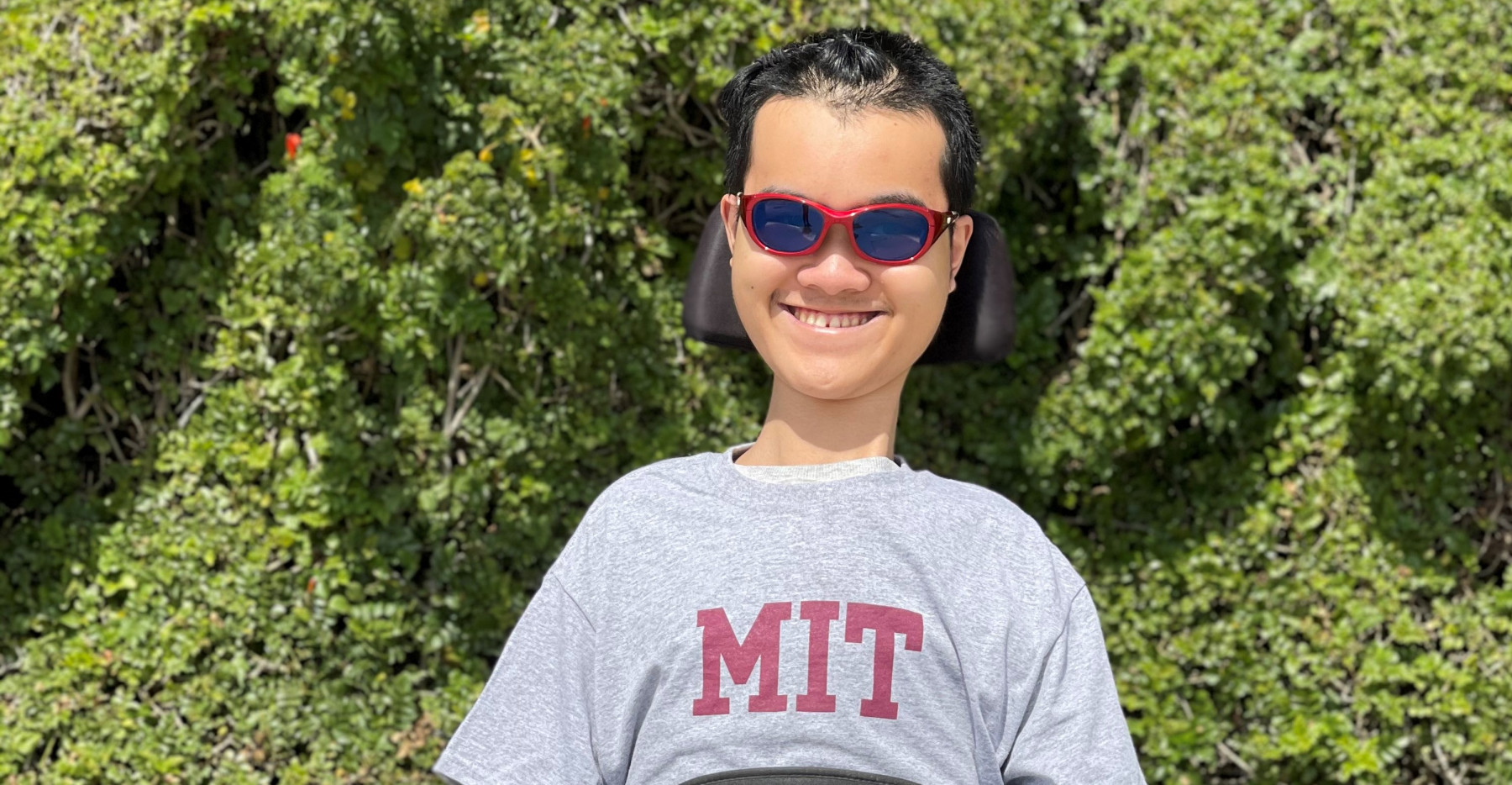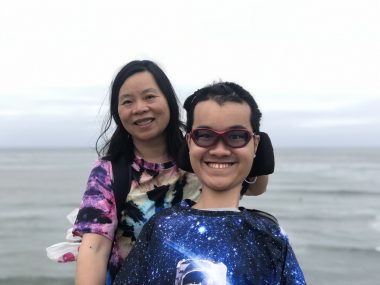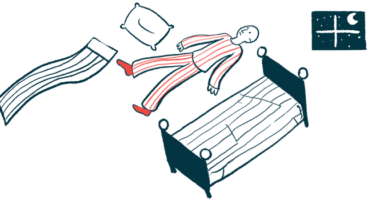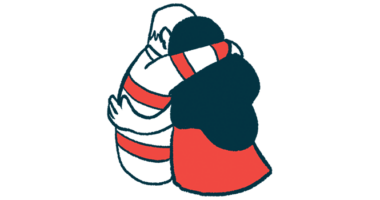SMA Doesn’t Stop Teen From Pursuing Academic Dreams at MIT

Photo courtesy of Jenny Huang
Ben Lou in a Massachusetts Institute of Technology T-shirt, where he is a freshman.
Ben Lou battles the weakness in his body that comes with having spinal muscular atrophy (SMA) type 2, but his mind is stronger than most: The 18-year-old was accepted to three of the most prestigious universities in the U.S.
Lou is now in his first year at the Massachusetts Institute of Technology (MIT), his dream school. But he also could have gone to the California Institute of Technology or to Harvard. He was home-schooled by his mother, Jenny Huang, who also is his full-time caregiver, until he started MIT.
“I’m grateful that I was lucky enough to get into these schools, because many talented students are rejected, unfortunately,” Lou said in an interview with SMA News Today. “I think I bring a unique perspective as a severely handicapped person. I’ve been told that there hasn’t been anyone as handicapped as me, with such a severe disability as me, who has attended MIT before.”

Ben Lou with his mother, Jenny Huang. (Photo courtesy of Jenny Huang)
Since he was 6 months old, Lou has been completely reliant on the help of others, like his mother. He’s been unable for most of his life to sit up on his own, and needed a body brace until he had spinal fusion surgery in 2013. He also has symptoms secondary to SMA, including obstructive sleep apnea, restrictive lung disease, hip dislocations, and digestive problems.
But he hasn’t let SMA get in the way of pursuing his love for learning. It also hasn’t stopped his positive attitude, which comes quite easily for this aspiring entrepreneur, mathematician, and academic researcher.
“You have two choices — you can sulk and be depressed, which is the easy thing. The other option is to stay positive and look for the best solution and I think that’s the logical choice,” Lou, a San Diego native, said. “One of my core principles is to always do the logical thing, whatever that is.”
Lou’s acceptance into MIT was preceded by quite a few notable academic successes.
As an eighth- and ninth-grader, he qualified for the United States of America Mathematical Olympiad. He was one of 250 students — mostly people in their junior or senior high school or college years — in the U.S. and Canada selected for the competition.
Lou also ranked in the highest percentile of high school students in physics in the 11th and 12th grades. He participated in the challenging F=ma exam to get to the next round of competition for the USA Physics Olympiad, and scored in the top 400 of the more than 6,000 students who took the test in 2020 and 2021.
When he wasn’t writing proofs or solving theoretical physics problems, he served as the Muscular Dystrophy Association advocate for San Diego and Imperial County from 2017 to 2019.
MIT had always been a dream school for Lou, because he appreciates the value it places on learning and it fits his passion for math, science, and discovery. On March 14, 2021, when MIT released its admission decisions — according to tradition, that day honors Pi day, which celebrates the mathematical ratio of a circle’s circumference to its diameter (3.14) — Lou was on edge.
“I was trying not to get my hopes up too much,” he said. “It was nervous anticipation.”
Lou was at his computer, finger on the refresh button for when the clock struck 3:14 p.m. EST, in keeping with the day’s theme.
“Finally, the time came, and I hit the reload. And I saw the banners come down,” he said. “I was completely overjoyed.”
While unable to physically attend the Cambridge, Massachusetts, campus this year, Lou plans to move to the Boston area with his mother in 2022. Virtual schooling also gives the family a chance to make preparations for housing, caregiving, and transportation.
Now, more than three weeks into his classes, Lou has settled into a groove of watching lectures, attempting difficult problem sets, and chatting it up with his teaching assistants for math and physics on topics outside a class’ scope, as he’s often the only one in attendance.
Every now and then he helps his sister, Lucy Lou, a senior majoring in computer science at the University of California Berkeley, by teaching her difficult physics concepts and helping her with homework.
He’s helped by Dragon dictation software when it comes to writing assignments, and uses a browser extension called EquatIO, which allows him to speak any equation into existence. With all other math problems, as he’s done his whole life, Lou figures them out in his head.
Once Lou gets into a routine at school, he hopes to join undergraduate research projects and perfect his own inventions aiming to help others with disabilities. These include a self-turning hammock, and a feeding tube that collects food and pushes it into a person’s mouth.
“I want to have a research career, and also an entrepreneurial career. Research can be somewhat risky in terms of how much your research will benefit people,” Lou said. “The entrepreneurial aspect, I know for sure that that’s gonna benefit people. So if I do them both, it’s like a safety net, and I do everything that matters to me.”
Lou has had a lifelong love of learning, in part aided by his mother’s efforts to educate him no matter what obstacles lay in the way. Huang earned her bachelor’s degree at Nanjing University in Eastern China, and attended graduate school at the Chinese Academy of Social Sciences. She eventually worked in cheminformatics — a field of information technology focused on the collection, storage, analysis, and manipulation of chemical data — after completing a second master’s degree at the University of Nebraska.
Huang has had to work within the time constraints imposed by SMA. Lou’s muscle weakness and reliance on others means it takes him nearly five times as long to do tasks such as bathing, toileting, and physical therapy. So his mother combined healthcare and learning.
“My approach is very unconventional,” said Huang, who Lou credits with giving him his strong science, technology, engineering, and math background. “The way we teach is you learn everywhere and at every moment.”
He learned about biology during doctor appointments, and through Huang’s use of Chinese healing practices like acupuncture; English by listening to literature during physical therapy; and environmental science by watching his mother garden, compost, and cook. For all the teaching she has done, Huang also learned something from Lou, too.
“I tend to be thinking of the worst situation and prepare for the worst situation. He’s happy and it makes things lighter,” Huang said. “His energy to solve problems is amazing, and he is willing to work hard and think differently. He never gives up.”








